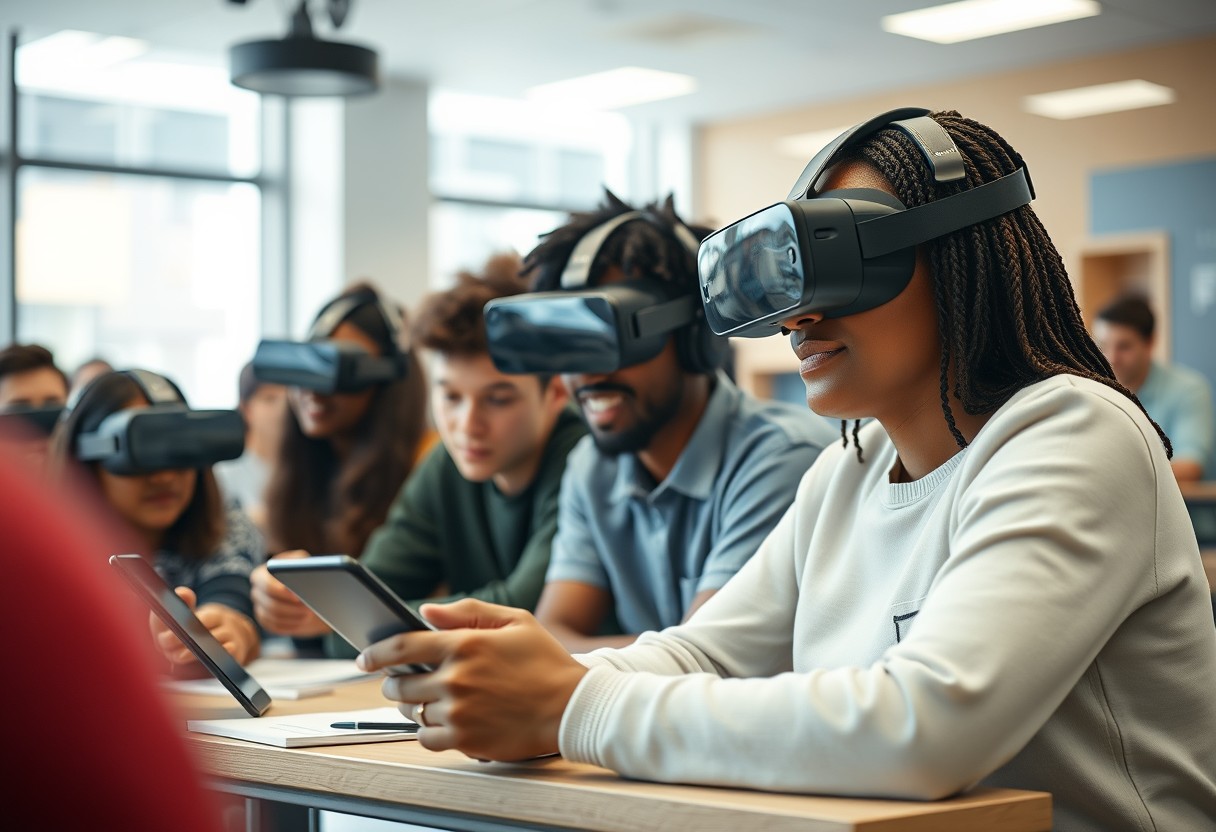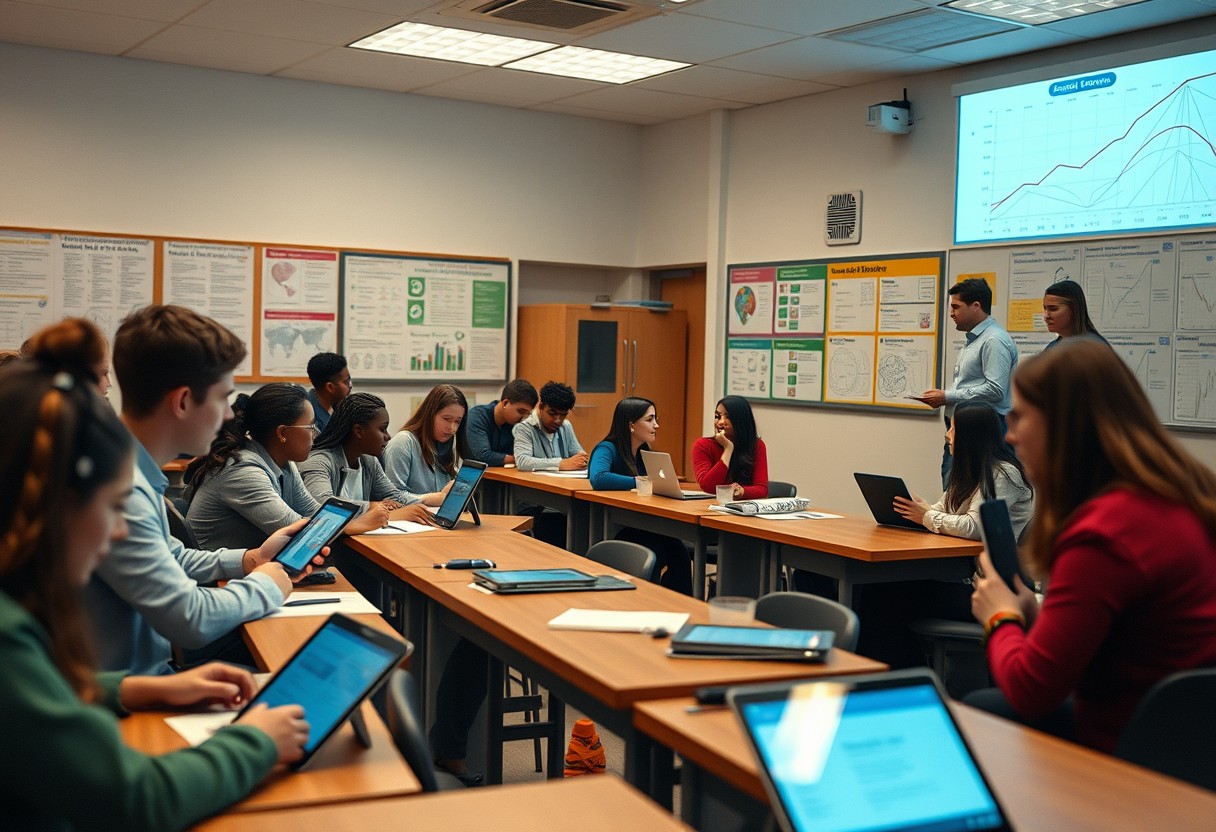AI Technology has revolutionized the way students learn by providing engaging and interactive educational games and apps that cater to individualized learning needs. By leveraging AI algorithms, these tools adapt to students’ progress, offering personalized feedback and challenges. This innovative approach not only enhances students’ learning experiences but also helps educators track and analyze performance data to make more informed instructional decisions. Discover the transformative impact of AI-powered educational technology in revolutionizing the classroom dynamic and fostering a love for learning in students.
The Rise of Educational Games and Apps
The Growing Demand for Interactive Learning Tools
The demand for interactive learning tools is continuously growing as educators and parents realize the benefits of engaging students through technology. Educational games and apps have become popular due to their ability to make learning fun and effective. Students are more motivated to learn when they can interact with the material in a meaningful way, which leads to better retention and understanding of the content.
The Role of Technology in Modern Education
With the rapid advancement of technology, its role in modern education has become more prominent than ever before. AI-powered educational games and apps have revolutionized the way students learn by personalizing the learning experience. These tools can adapt to the individual needs of each student, providing targeted feedback and guidance to help them achieve better results.
Tools like adaptive learning platforms use AI algorithms to analyze each student’s performance and tailor the content to suit their learning style. This level of personalization allows students to learn at their own pace and focus on areas where they need improvement, ultimately leading to a more efficient and engaging learning experience.
The Power of AI in Education
Personalized Learning Experiences
To truly engage students in their learning journey, AI technology has the power to offer personalized learning experiences tailored to each individual’s needs. Assuming that every student has a unique learning style and pace, AI algorithms can analyze students’ progress, strengths, and weaknesses to provide targeted educational content. This personalized approach ensures that students are challenged at the right level, keeping them motivated and enhancing their understanding of the material.
Intelligent Tutoring Systems
Tutoring through AI is revolutionizing the way students receive help and guidance outside of the traditional classroom setting. With intelligent tutoring systems, students can interact with virtual tutors that adapt to their learning patterns and provide real-time feedback. These systems can identify areas where students are struggling and offer additional support, fostering a more effective learning process.
Personalized and adaptive, these intelligent tutoring systems have the potential to greatly improve student outcomes by offering individualized attention and support that is not always feasible in a traditional classroom setting.
Engaging Students with Interactive Content
Gamification in the Classroom
It is evident that incorporating gamification in the classroom can significantly enhance student engagement and motivation. By integrating game elements such as points, leaderboards, and rewards into educational activities, teachers can create an interactive and competitive learning environment. Students are more likely to be actively involved in lessons when they perceive them as fun and challenging. This approach not only fosters a sense of accomplishment but also encourages collaboration and critical thinking among students.
Immersive Learning Environments
With the rise of technology, educators now have the opportunity to create immersive learning environments using AI-powered educational games and apps. These environments offer students a unique and interactive way to engage with course material, making learning more dynamic and personalized. By leveraging AI technology, teachers can tailor the learning experience to individual student needs, providing real-time feedback and adaptive learning pathways.
Immersive learning environments can simulate complex scenarios and phenomena that may be challenging to experience in a traditional classroom setting. This hands-on approach allows students to explore, experiment, and learn from their mistakes in a safe and controlled environment, enhancing their understanding and retention of the subject matter.
Gamification and immersive learning environments offer educators powerful tools to foster student engagement and enhance learning outcomes. By creating interactive content that leverages AI technology, teachers can transform the way students interact with course material, making learning more enjoyable, effective, and impactful.

AI-Powered Adaptive Assessments
Not only do educational games and apps powered by AI technology engage students in a fun and interactive learning experience, but they also offer AI-powered adaptive assessments. These assessments provide personalized feedback and evaluation to help students improve their understanding and performance.
Real-Time Feedback and Evaluation
Assessments in real-time offer students immediate feedback on their progress, allowing them to track their performance and identify areas that need improvement. This personalized approach enhances learning outcomes by targeting specific gaps in knowledge and providing tailored support to address them.
Identifying Knowledge Gaps and Strengths
Assessments powered by AI technology can analyze a student’s responses to pinpoint knowledge gaps and strengths accurately. By understanding individual learning needs, educators can customize teaching strategies to meet students where they are, leading to more effective and personalized instruction.
Feedback from these assessments equips educators with valuable insights into each student’s learning journey. By leveraging data on knowledge gaps and strengths, teachers can create targeted interventions to support student progress and ensure mastery of key concepts.
Intelligent Virtual Learning Environments
After exploring educational games and apps, let’s investigate into the world of Intelligent Virtual Learning Environments, where AI technology revolutionizes how students engage with academic content.
Simulations and Virtual Labs
Learning in virtual environments through simulations and virtual labs has transformed traditional education methods. AI-powered simulations allow students to practice real-world skills in a safe and controlled setting. These environments provide an interactive and immersive experience, enhancing student engagement and knowledge retention. Students can make mistakes, learn from them, and apply their understanding in a practical context, making learning more dynamic and impactful.
AI-Driven Conversational Interfaces
Learning through AI-driven conversational interfaces introduces a personalized and intuitive way for students to interact with educational content. These interfaces use natural language processing and machine learning algorithms to understand student queries, provide instant feedback, and adaptive learning pathways. By fostering interactive conversations, students can receive immediate assistance, explanations, and guidance tailored to their individual learning styles.
Plus, AI-driven conversational interfaces can track student progress, identify learning gaps, and offer customized learning recommendations. This personalized approach enhances student motivation and helps educators provide targeted support, ultimately improving learning outcomes.
Enhancing Student Collaboration and Communication
To improve collaboration and communication among students, educational games and apps powered by AI technology play a crucial role. These tools provide interactive platforms where students can engage in various group projects and discussions, fostering teamwork and effective communication skills. By incorporating AI algorithms, these apps can offer personalized recommendations and feedback to enhance the overall learning experience.
AI-Facilitated Group Projects and Discussions
One of the significant advantages of AI-facilitated group projects and discussions is the ability to match students with diverse skill sets and learning styles. This feature ensures that each group is well-rounded, encouraging peer-to-peer learning and collaboration. Additionally, AI can analyze students’ contributions during discussions and provide insights on areas where improvement is needed, promoting a more dynamic and engaging learning environment.
Virtual Debates and Role-Playing Exercises
An crucial component of enhancing student collaboration and communication is through virtual debates and role-playing exercises. These activities allow students to practice critical thinking skills, articulate their arguments effectively, and engage in respectful discourse with their peers. AI-powered simulations can create realistic scenarios for debates and role-playing, offering students a hands-on learning experience that stimulates active participation and boosts confidence in their communication abilities.
Debates and role-playing exercises are valuable tools for developing students’ problem-solving skills and empathy, as they are encouraged to see issues from different perspectives and communicate their ideas persuasively. By leveraging AI technology to facilitate these activities, educators can create an immersive and interactive learning environment that enhances students’ collaboration and communication skills.
Accessibility and Inclusivity in AI-Driven Education
Customized Learning Paths for Diverse Learners
Unlike traditional educational approaches, AI-powered tools have the potential to create customized learning paths for diverse learners. AI technology can analyze students’ strengths, weaknesses, and learning styles to tailor educational content and activities to meet their specific needs. This customization can help students who may struggle with traditional teaching methods to engage more effectively and succeed in their learning journey.
AI-Driven Support for Students with Disabilities
For students with disabilities, AI-driven support can play a crucial role in ensuring equal access to education. AI-powered tools can provide personalized assistance, such as speech-to-text functions, adaptive learning programs, and real-time feedback mechanisms to help students with disabilities overcome learning barriers. These tools can empower students to learn at their own pace and in a way that suits their individual needs, fostering a more inclusive educational environment.
Paths: AI-driven support can significantly enhance the learning experience for students with disabilities by offering tailored solutions to accommodate their specific challenges. Whether through interactive visualizations, auditory cues, or adaptive quizzes, AI technology can provide the necessary support to help these students thrive in the academic setting.
The Future of Teacher-Student Interaction
AI-Assisted Grading and Feedback
One of the most transformative aspects of AI technology in education is its ability to assist with grading and providing feedback to students. AI algorithms can analyze student work at a rapid pace, providing instant feedback on quizzes, assignments, and even essays. This immediate response helps students to understand their mistakes and areas for improvement without having to wait for a teacher to review their work.
Human-AI Collaboration in the Classroom
HumanAI Collaboration in the Classroom represents a dynamic partnership between teachers and AI technology to enhance the learning experience for students. AI can help teachers personalize lesson plans and educational materials for each student’s needs, freeing up educators to focus on providing individualized attention and support in the classroom.
With advances in Natural Language Processing (NLP) and machine learning, AI can also assist in facilitating classroom discussions and group activities, ensuring that every student has the opportunity to participate and engage with the material. This collaborative approach fosters a more interactive and inclusive learning environment, where both teachers and AI technology work together to support student success.
Addressing Concerns and Challenges
Ensuring AI Bias-Free Education
To ensure AI bias-free education, it is crucial for developers to embed ethical practices into the design and implementation of educational games and apps. Despite the incredible potential of AI technology to revolutionize education, there is a growing concern about the perpetuation of biases in these systems. To mitigate this risk, developers must carefully examine the data used to train AI algorithms, identify and eliminate biases present in the data, and regularly monitor and evaluate the performance of the AI systems to prevent any biased outcomes.
Balancing Technology with Human Interaction
Balancing Technology with Human Interaction is key to optimizing the effectiveness of AI-powered educational games and apps. While AI technology can personalize learning experiences and provide valuable insights into student performance, it is imperative to address the importance of human interaction in the learning process. Concerns about over-reliance on technology and lack of human engagement highlight the need to strike a balance between leveraging AI capabilities and fostering meaningful teacher-student interactions.
Concerns about the potential dehumanization of education due to excessive reliance on AI technology underline the importance of maintaining human connections in the learning environment. While AI can enhance student engagement and motivation, it should complement, not replace, the unique value that human educators bring to the learning experience.
Implementing AI-Powered Educational Games and Apps
Once again, as schools and educational institutions start to integrate AI-powered educational games and apps into their teaching methodologies, they must consider various factors to ensure a seamless implementation.
Integration with Existing Curricula and Infrastructure
The incorporation of AI technology in educational games and apps should complement the existing curricula and infrastructure rather than disrupt them. Educators need to carefully assess how these new tools align with their teaching goals and standards to ensure a harmonious integration.
Teacher Training and Support
To effectively implement AI-powered educational games and apps in the classroom, teachers must receive adequate training and ongoing support. They need to be familiar with the technology and understand how to leverage it to enhance student learning experiences.
With the right training and support, educators can confidently integrate AI-powered tools into their lesson plans and effectively monitor student progress and engagement. This hands-on approach can empower teachers to adapt their teaching methods and provide personalized learning experiences for each student.
Measuring the Impact of AI-Driven Education
Now, let’s research into how we can effectively measure the impact of AI-driven education. By quantifying student engagement and motivation, educators can gauge the effectiveness of AI-powered games and apps in keeping learners interested and inspired.
Quantifying Student Engagement and Motivation
AIDriven technology can track various metrics such as time spent on tasks, interaction levels, and progress rates. By analyzing this data, educators can gain insights into students’ engagement levels and tailor educational content to better motivate and stimulate learning.
Evaluating Learning Outcomes and Academic Achievement
Quantifying the impact of AI-driven education extends to evaluating learning outcomes and academic achievement. By analyzing student performance data generated by AI algorithms, educators can assess the effectiveness of the educational games and apps in improving students’ knowledge retention and academic success.
Academic success is a crucial aspect of evaluating the efficacy of AI-driven education. By measuring students’ progress, test scores, and overall academic performance, educators can determine the direct influence of AI-powered tools on enhancing learning outcomes and boosting achievement levels.
The Role of AI in Continuous Professional Development
AI-Driven Teacher Training and Resources
All educators strive to provide the best learning experiences for their students, and AI technology is revolutionizing the way teachers can improve their skills. Professional development through AI-driven platforms offers personalized training, feedback, and resources tailored to individual teaching styles and needs. These systems analyze data on classroom interactions, student performance, and teaching methodologies to provide real-time insights and suggestions to enhance teaching practices.
Staying Ahead of the Technological Curve
Role of AI in continuous professional development goes beyond just improving teaching skills. Educators need to stay abreast of the latest technological advancements to effectively integrate new tools into their teaching strategies. AI technologies can help educators identify emerging trends in educational apps, games, and other resources that can engage students and improve learning outcomes.
AIDriven continuous professional development ensures that teachers are equipped with the knowledge and skills to adapt to the evolving educational landscape. By embracing AI-powered tools and resources, educators can enhance their teaching effectiveness and provide students with a more engaging and personalized learning experience.
Ethical Considerations and Responsibilities
Data Privacy and Security in Educational AI
Your students’ data privacy and security are of utmost importance when it comes to using educational games and apps powered by AI technology. Data protection regulations must be strictly adhered to, and any personal information collected should only be used for educational purposes. Implementing encryption techniques and secure servers to store data are vital steps in safeguarding sensitive information. As an educator, it is your responsibility to ensure that the technology used in the classroom prioritizes the privacy and security of your students’ data.
Ensuring Transparency and Accountability
Data transparency and accountability are key components that must be integrated into the educational AI systems. Educators should have a clear understanding of how the AI algorithms work and what data is being collected. Ethical considerations must be taken into account, and decisions regarding the use of AI technology should be made with the best interests of the students in mind. Regular audits and checks should be conducted to ensure that the AI systems are operating ethically and responsibly.
By fostering a culture of transparency and accountability, educators can build trust with students, parents, and the wider community. It is important to be open and honest about the use of AI technology in the classroom, addressing any concerns and seeking feedback to continuously improve the educational experience.
1. AI technology enhances educational games for student engagement.
2. Personalized learning experiences cater to individual student needs.
3. Real-time feedback supports student progress and learning outcomes.
4. Adaptive difficulty levels challenge students at their own pace.
5. Gamification boosts motivation and interest in learning activities.
6. AI analyzes student data to improve game performance and outcomes.
To wrap up
The potential for AI-powered educational games and apps to engage students and enhance their learning experiences is vast. By utilizing AI technology, developers can create personalized and adaptive learning experiences that cater to individual student needs and preferences. This not only makes learning more interactive and enjoyable but also ensures that students receive tailored support to help them reach their full potential.
The integration of AI into educational games and apps represents an exciting evolution in the field of education, offering new possibilities for teachers, students, and developers alike. As AI continues to advance, we can expect to see even more innovative and effective learning tools being developed to support students in their educational journeys. By harnessing the power of AI technology, we have the opportunity to revolutionize the way we learn and teach, ultimately paving the way for a more engaging and impactful educational experience for all.
FAQ
Q: How can educational games and apps be enhanced with AI technology?
A: Educational games and apps can be enhanced with AI technology by personalizing learning experiences, providing real-time feedback, and adapting to individual student needs.
Q: What are the benefits of using AI-powered educational games and apps in the classroom?
A: The benefits of using AI-powered educational games and apps in the classroom include increased engagement, improved learning outcomes, and better tracking of student progress.
Q: How does AI technology personalize learning experiences in educational games and apps?
A: AI technology personalizes learning experiences in educational games and apps by analyzing student data and adjusting the difficulty level, content, and pace of learning to suit each student’s needs.
Q: Can AI-powered educational games and apps provide real-time feedback to students?
A: Yes, AI-powered educational games and apps can provide real-time feedback to students by analyzing their interactions within the game or app and offering immediate guidance or suggestions for improvement.
Q: How do AI-powered educational games and apps adapt to individual student needs?
A: AI-powered educational games and apps adapt to individual student needs by using algorithms to identify learning gaps, strengths, and preferences, and then tailoring the content and challenges accordingly.
Q: Are there any challenges or limitations to integrating AI technology into educational games and apps?
A: Some challenges and limitations to integrating AI technology into educational games and apps include concerns about data privacy, the need for teacher training, and ensuring that the technology is accessible to all students.
Q: What does the future hold for the use of AI technology in educational games and apps?
A: The future of AI technology in educational games and apps looks promising, with continued advancements in personalized learning, adaptive technologies, and the potential for even more immersive and interactive educational experiences.




